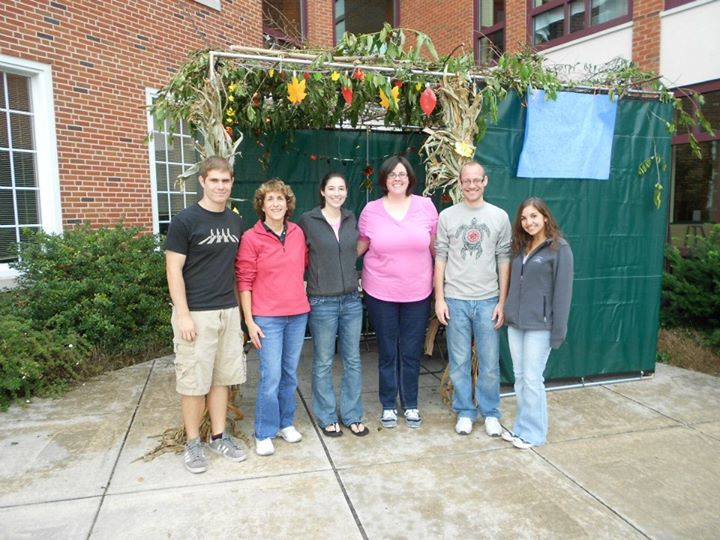The week-long Elizabethtown College Sukkah celebration will begin with a dedication ceremony Wednesday, Sept. 18 at 4 p. m. on the Brossman Commons patio. Dr. Amy Milligan, visiting assistant professor of Women and Gender Studies, and Reverend Amy Shorner-Johnson, assistant chaplain, said the dedication of the Sukkah gives the community a chance to learn about the structure of the Jewish holiday.
“Our Sukkah is a reminder of sharing interfaith hospitality and represents our desire to welcome everyone to the table,” Milligan said.
Milligan explains that Sukkot, sometimes called the “feast of tabernacles”, is a holiday celebrated by Jewish communities around the world, and it is meant to remind people of the joy life brings. Sukkot always occurs after the solemn holidays of Rosh Hashana (the Jewish New Year) and Yom Kippur (a time of atonement); this year it is observed from Sept. 18 to 25.
“Our hope is that the Sukkah will be used by many different people on campus as they enjoy the outdoors at the beginning of the fall season.”
During the holiday, a sukkah—a temporary, tent-like structure—is built to remind the Jews of the 40 years spent wandering in the desert. Traditionally, the building is used to bring the community together for meals and socializing. The Sukkah on campus will be used in much the same way. Classes and clubs can hold meetings there, and meals, studying and socializing in the Sukkah are all welcome activities. Faculty-led programs such as Milligan Munchies, Coffee with Coren and Brunch with Bergel are scheduled to aid in teaching students and faculty about the celebration of Sukkot. Students can also volunteer to help set up the sukkah.
“Our hope is that the Sukkah will be used by many different people on campus as they enjoy the outdoors at the beginning of the fall season,” Milligan said. “For many contemporary Jews, the Sukkah is a reminder that true security does not come through earthly or material possessions but rather through meaningful relationships with God, family and community,” Milligan said.
Shorner-Johnson explained the connections of the College’s Sukkah celebration to our strategic goal of educating the community about other religious practices.
“While many folks may know a bit about Judaism, they are less likely to know about Sukkot,” Shorner-Johnson said. “This is a way for people to come and see without the intimidation of having to know a lot about it.” She adds that this is a holiday commonly celebrated at home, so holding a Sukkah celebration allows Jewish students to more easily practice their faith and for others to observe in a more accessible environment. She hopes that this celebration will honor and show support for Jewish students, particularly when many religious traditions outside of Christianity are forgotten.
“I also think it is important to educate others about the generous hospitality of other faiths and practices,” Shorner-Johnson said. “We hope to have more kinds of these events surrounding other religious practices.”
Milligan and Shorner-Johnson encourage all members of the campus community to explore the Sukkah at any time and learn about the holiday and Jewish traditions in general.
“Anyone can come ask questions or look around when they pass the Sukkah,” said Shorner-Johnson.
This year, various campus offices are sponsoring the Sukkah. They include Hillel, the Chaplain’s Office, the Office of Diversity and the Better Together Campaign.


